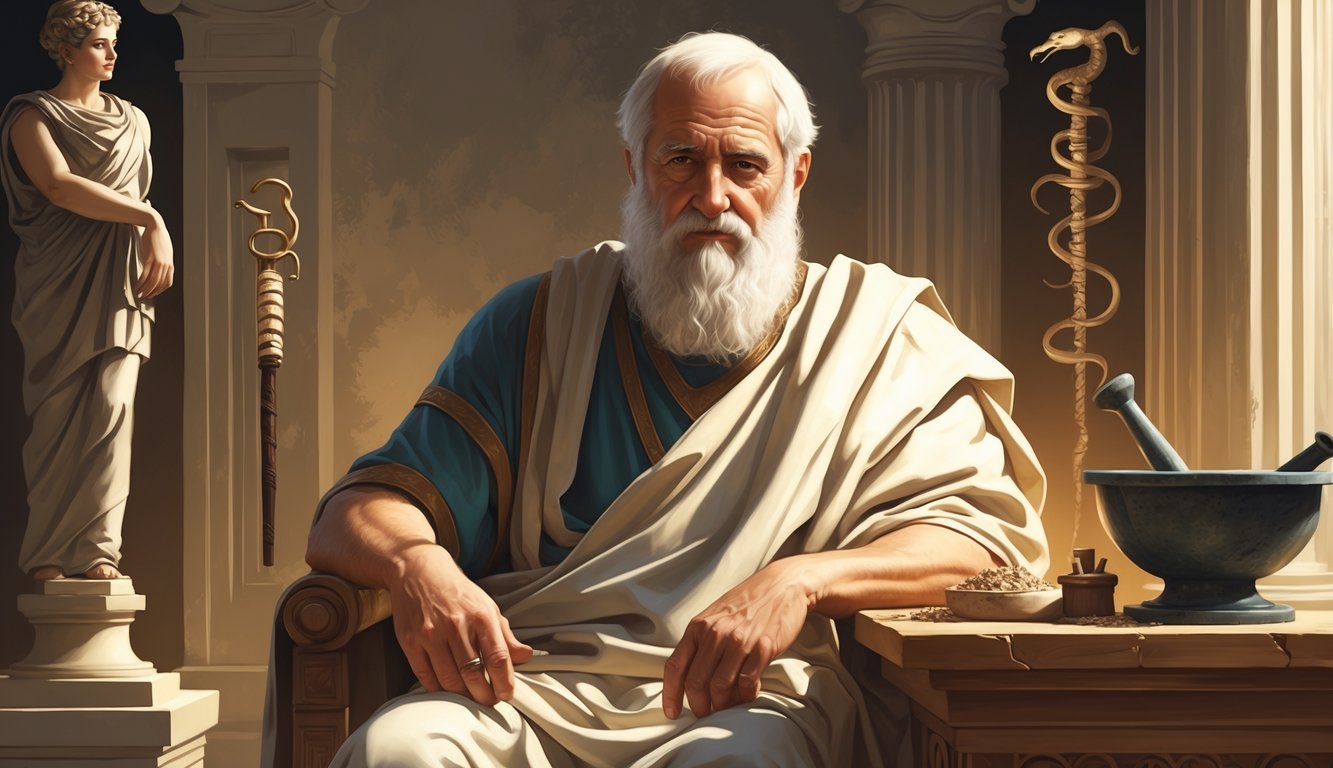PsychNewsDaily Publishers
100 Summit Drive
Burlington, MA, 01803
Telephone: (320) 349-2484
PsychNewsDaily Publishers
100 Summit Drive
Burlington, MA, 01803
Telephone: (320) 349-2484
Hippocrates, born around 460 BC on the island of Kos, revolutionized medicine by promoting observation, ethics, and the separation of medical practice from superstition.

Hippocrates lived over 2,400 years ago in ancient Greece. People often call him the father of medicine because he shaped how doctors understand and treat patients, even now.
He was born on the island of Kos. His family included several doctors, so he grew up surrounded by medical knowledge. Hippocrates used what he learned to help turn medicine into a science based on observation and ethics.
Maybe you’ve heard of the Hippocratic Oath. Doctors still take this promise, and it reflects his strong views about how they should act. Hippocrates’ work laid the groundwork for modern medicine, moving it away from myths and guesswork and toward a more careful and respectful practice.

Let’s look at Hippocrates’ family roots, his education, and his travels during the Classical period. These details show how he grew into the famous physician we know today.
Hippocrates was born around 460 BC on Kos. His family belonged to the Asclepiad tribe, which traced its history back to Asclepius, the god of healing.
That connection gave Hippocrates a strong medical heritage. His father, Heraclides, practiced medicine too, and their family passed down medical knowledge for generations.
This background explains why Hippocrates became so skilled in healing. The Asclepiad tradition mixed religious healing with early science, shaping how he saw medicine.
Hippocrates probably learned from his father and other doctors on Kos. The island had one of the earliest medical schools, and people there organized medical practice more than in other parts of Greece.
He also picked up ideas from ancient thinkers like Plato and Aristotle. Their views on nature and reason helped him see sickness as a natural process.
He focused on careful observation of patients, not blaming gods or spirits. That approach shifted how people practiced and taught medicine.
Hippocrates traveled quite a bit in his lifetime. He visited places like Larissa in Greece and towns in southern Italy.
During his journeys, he shared his knowledge and spread better medical practices. These trips helped medicine grow beyond Kos.
Meeting scholars and healers from other places enriched his methods. These experiences shaped the principles that became known as the Hippocratic tradition.

Hippocrates changed how people practiced medicine. He brought careful study and clear rules to doctors’ work.
His efforts moved medicine from superstition to a scientific and ethical field. Let’s look at his key medical writings, ways to diagnose and predict illnesses, his principles for medical ethics, and his ideas about the body.
The Hippocratic Corpus is a set of medical texts linked to Hippocrates and his followers. These writings talk about illnesses, treatments, and ways to observe patients.
You can find case histories that describe real symptoms and outcomes. This helped doctors keep better medical records.
The texts pushed for a clear, careful style so others could learn from experience. This body of work laid the foundation for later Greek physicians.
The medical school at Cos taught doctors to use observation and reason, thanks to these writings.
Hippocrates focused on diagnosis and prognosis—figuring out what’s wrong and predicting how it’ll go. He taught doctors to watch symptoms closely and notice patterns over time.
Understanding the course of an illness helps doctors make better decisions. He avoided blaming the gods and promoted clinical observation.
Diagnosis became a key skill, with doctors listening to patient stories and watching for changes. This approach led to modern ways of checking a patient’s health and treatment.
One of Hippocrates’s biggest gifts is the Hippocratic Oath. This set of promises guides doctors to act honestly and put patients first.
The oath tells doctors to not harm patients and avoid treatments they can’t handle. It set early boundaries for the medical profession and made doctors responsible.
Though the words have changed over time, this code still shapes medical practice. It started the idea that medicine is a moral commitment to healing.
Hippocrates introduced the idea of the four humors: blood, phlegm, yellow bile, and black bile. He believed you stayed healthy when these fluids stayed balanced.
This humoral theory was one of the first scientific ways to explain the body and disease. When humors went out of balance, people got sick, so doctors aimed to restore harmony.
Modern medicine doesn’t use this theory anymore, but it shaped early ideas about physiology. Hippocrates also stressed the body’s healing power of nature—he believed your body tries to fix itself when it can.
His focus on natural causes helped move medicine away from superstition and toward real biology.

Here are some answers about Hippocrates’ main work in medicine, his early years, and why he mattered. You’ll also find out where he lived, what he discovered, and a bit about his family life.
People know Hippocrates as the “Father of Medicine” because he separated medicine from superstition. He promoted careful observation and the idea that illnesses come from natural causes.
He wrote the Hippocratic Oath, which guides doctors to practice ethically.
Hippocrates was born around 460 BC on Kos. He came from a family of physicians, so he learned medicine from a young age.
His training mixed hands-on experience with knowledge passed down over generations.
Hippocrates studied diseases by watching symptoms and noting patterns. He didn’t rely on magical explanations.
He also believed the body could heal itself if given the right conditions.
He lived mainly on the island of Kos in Greece. Kos was famous for its medical school and hospitals.
Living there helped him study medicine with other physicians.
Hippocrates was an ancient Greek doctor and thinker from around 460 BC. He changed medicine by focusing on science and ethics.
Thanks to his work, medicine became a respected profession.
Honestly, we don’t know much about Hippocrates’ family life. He was Heraklides’ son and grew up in a family of doctors.
People haven’t found clear records about his spouse or children. The details just aren’t out there.